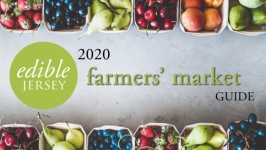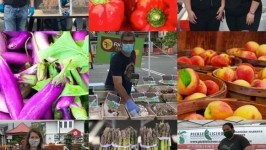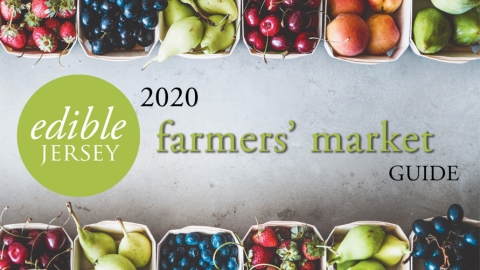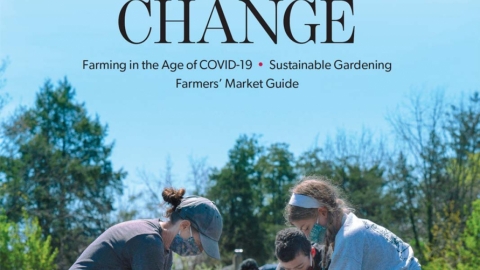Farmers' Market Finds
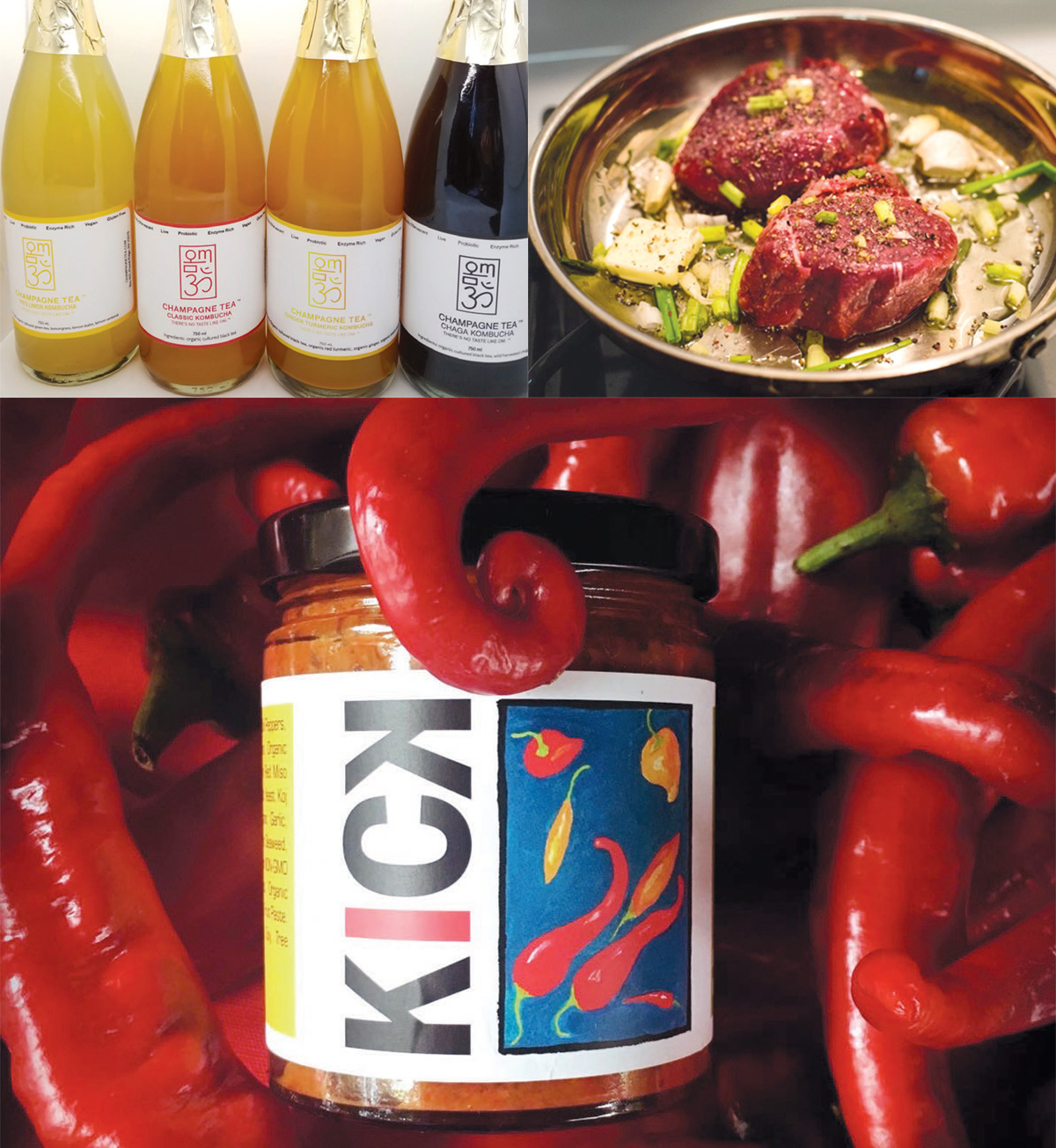
PHOTOGRAPHS COURTESY OF: KICK SAMBAL, OM CHAMPAGNE TEA, BUCK WILD BISON
In the past 20 years, the number of farmers’ markets in the state has increased more than three-fold. The New Jersey Department of Agriculture estimated there were 40 community farmers’ markets across the state in 2000. That number jumped to more than 80 in 2007, and it has held steady at roughly 140 over the past few years. This summer, an estimated 130 community farmers’ markets will convene in NJ, a remarkable achievement in the age of COVID-19 (see page 18) and good news for the farm-to-table stalwarts who want to support local farmers and food artisans.
A good farmers’ market is an incubator for food entrepreneurs, who can introduce new foods to the public and get immediate feedback on taste, packaging and price—all on a small budget.
“It’s their first opportunity to engage with consumers, see what works and what doesn’t, what consumers like and what they don’t like,” says Chris Cirkus, manager of both the Trenton and West Windsor farmers’ markets.
Turning passion into a profitable food business requires a solid business plan and often a sizable budget for research, marketing and development. Farmers’ markets allow an entrepreneur to take it slowly and scale up at their own pace. Cirkus says she has watched several food producers get their start at farmers’ markets and stay there long after their products have become supermarket staples. First Field, a Princeton-based company that sells gourmet ketchup and other tomato-based products using Jersey grown tomatoes, remains at the West Windsor market. “They have a direct line to consumers to conduct product research and get consumer feedback on a continual basis,” Cirkus says.
Nancy Boone, manager of the Ramsey Farmers’ Market, notes that Anita’s Guacamole of Philadelphia and Healing Home Foods of Pound Ridge, NY, came to her market years ago and have since been picked up by supermarkets and gourmet groceries. Yet, they also come back year after year for the raw feedback they receive from a loyal customer base.
“It’s a two-way street,” Boone says. “Farmers’ market followers get to know the folks who work so hard to bring all these products to the market, while our vendors receive the satisfaction and appreciation from our patrons.”
Edible Jersey scoured the farmers’ market scene to find fledgling food artisans who may have the right recipe for success.
“I WOULDN’T BE IN BUSINESS IF IT WASN’T FOR FARMERS’ MARKETS. I STARTED WITH NOTHING— NO FARMING EXPERIENCE, NO LAND, NO MONEY—AND I LEARNED THE BUSINESS ONE STEP AT A TIME. NOW, I’M SELLING MY OWN MEAT DIRECTLY TO REPEAT CUSTOMERS EACH WEEK.”
—Shane Robbins of Buck Wild Bison
Kick Sambal
When Eric and Tanja Israel emigrated from the Netherlands in 1999, they left behind the adopted Indonesian flavors of their homeland—and their beloved sambal.
Over time, the Mahwah couple created their own version of the Indonesian condiment, which is considered a hot sauce but is really more like a chutney made with ghost peppers, Thai chiles, onions, garlic and candlenuts. That stir-fried base, mixed with seaweed, aged miso, soy protein, blackstrap molasses and pungent spices, delivers a swift kick to this aptly named product.
For Eric Israel, whose parents grew up in the former Dutch East Indies, sambal is an integral part of his culinary heritage. He uses the fiery condiment on everything from whitefish and eggs to grilled cheese and peanut butter sandwiches, although it’s traditionally served with rice, vegetable and meat dishes to enhance the flavors of each respective food.
In 2018, the Israels introduced Kick Sambal at the Ramsey Farmers’ Market, a place they described as an ideal setting to allow potential customers to taste their versatile spread, discuss its health benefits and explain how it is eaten.
“The farmers’ market is a fantastic tool because it’s closely connected to a community of healthy eaters,” Eric says. “That was very appealing to us.”
Kick Sambal is sold at the Ramsey Farmers’ Market. Heat levels range from Virgin to Extra Hot.
Om Champagne Tea
In 2009, James Hibler and his wife, J.Y. Lym, bought a kombucha tea culture from an Amish farmer in Lancaster County, PA, so they could start experimenting with a home brew. Their goal was to recapture the taste and health benefits of the cleansing drink they discovered many years earlier while living in the Santa Cruz Mountains of California. Two years later, they were selling their fermented tea in recycled beer bottles at small farmers’ markets near their home in upstate New York.
The couple, who moved to Passaic County with their five children last year, originally called their company Om Kombucha. Then, one day in 2012, Hibler explained to a customer how he made his nonalcoholic, probiotic cultured tea and gave her a sip. She said it tasted more like a bubbly champagne than an “energy drink.” The couple changed the company name to Om Champagne Tea, redesigned the label and started packaging their kombucha in clear champagne bottles.
“It’s like a bottle of wine. It’s a premium product,” Hibler says, noting that he uses premium ingredients like Hawaiian red turmeric and locally grown biodynamic botanicals in pharmaceutical grade water to make his slightly sparkling beverage. The current roster of flavors includes Classic, Ginger Tumeric, Chaga, Mango Red Shiso and Tres Limon. Seasonal flavors include SuperGreen, Korean Red Ginseng and Grapefruit Matcha.
Hibler says the frank conversations with customers at the farmers’ markets have been a huge benefit. “I developed my recipe with my customers, tweaking and asking them questions every step of the way. We put ourselves in front of thousands of people every year and got instantaneous feedback. It’s a great way to stay in touch with our customers.”
Om Champagne Tea is sold regularly at the Moorestown, Ramsey and Wayne farmers’ markets, and often makes an appearance at several summer markets along the Jersey Shore.
Buck Wild Bison
If you ask Shane Robbins what’s for dinner, the answer is always bison.
Robbins, of Atco, Camden County, partnered with a bison farmer in Pennsylvania for three years to learn how to humanely raise the majestic creatures and sell their nutritious meat at local farmers’ markets. The response from customers was so positive, Robbins saved up enough money to strike out on his own. Robbins, along with his business partner and brother, Ryan, bought 30 bison and 30 acres in Cumberland County’s Port Norris last year. Now, the brothers sell the meat they harvest from their own animals. (They offer their bison a choice of grass or non-GMO grain to eat, and the bison usually choose both, which results in better tasting, less gamey meat.)
Robbins continues to work a beverage sales route for now, while he and his family grow their herd. “There’s a lot of sales potential, but it requires more land. I hope to own quite a few farms,” he says.
Drawn to the sustainable nature of farming and preserving a beast that was nearly driven to extinction, Robbins is also helping to revive a portion of Cumberland County that has seen better economic times. His farm is situated between Bivalve and Shell Pile, two towns that were once part of the state’s booming oyster industry until the state’s oyster populations were ravaged by diseases.
Robbins says he doesn’t have plans to wholesale the meat. “Selling at farmers’ markets is the most profitable way for me to do business,” he says, adding that the one-on-one interaction allows him to explain health benefits and cooking instructions with each purchase. “Especially for bison, it’s new to a lot of people, and they don’t know how to cook it.”
Buck Wild Bison is sold at Collingswood and Ocean City farmers’ markets. Robbins sells most cuts of meat, including hot dogs, burgers, sausage, roasts, steaks and ribs.
Editor’s note: Farmers’ market schedules remain in flux; it’s best to confirm operating status before you go.


